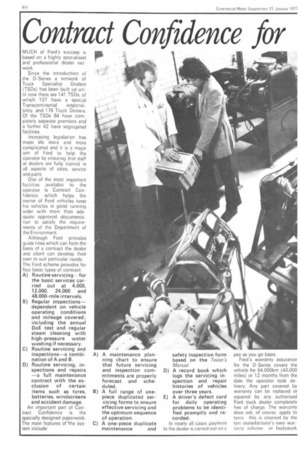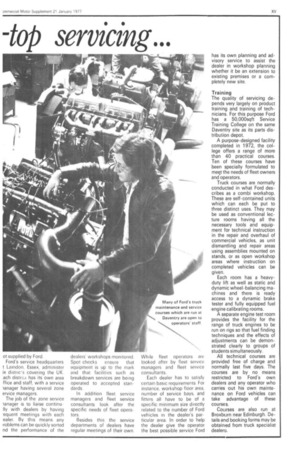Contract Confidence for
Page 108

Page 109

If you've noticed an error in this article please click here to report it so we can fix it.
• •
-top sermang...
MUCH of Ford's success s based on a highly specialised and professional dealer network.
Since the introduction of the D-Series a network of Truck Specialist Dealers (TSDs) has been built up until now there are 141 TSDs. of which 107 have a special
Transcontinental responsibility. and 176 Truck Dealers. Of the TSDs 84 have completely separate premises and a further 42 have segregated facilities.
Increasing legislation has made life more and more complicated and it is a major aim of Ford to help the operator by ensuring that staff at dealers are fully trained in all aspects of sales, service and parts.
One of the most important facilities available to the operator is Contract Confidence, which helps the owner of Ford vehicles keep his vehicles in good running order with more than adequate approved documentation to satisfy the requirements of the Department of the Environment.
Although Ford provides guide lines which can form the basis of a contract the dealer and client can develop their own to suit particular needs. The Ford scheme provides for four basic types of contract: A) Routine servicing—for the basic services carried out at 4,000, 12,000, 24,000 and 48,000-mile intervals.
B) Regular inspections— dependent on vehicle operating -conditions and mileage covered; including the annual DoE test and regular steam cleaning with high-pressure water washing if necessary.
C) Routine servicing and inspections—a combiA) nation of A and B.
D) Routine servicing, inspections and repairs —a full maintenance contract with the exclusion of certain items such as tyres. B) batteries, windscreens and accident damage.
An important part of Contract Confidence is the specially designed paperwork.
The main features of the sysC) tern include:
A maintenance planning chart to ensure that future servicing and inspection commitments are properly forecast and scheduled.
A full range of onepiece duplicated servicing forms to ensure effective servicing and the optimum sequence of operation.
A one-piece duplicate maintenance and safety inspection form based on the Tester's Manual.
D) A record book which logs the servicing inspection and repair histories of vehicles over three years.
E) A driver's defect card for daily operating problems to be identified promptly and recorded.
In nearly all cases payment to the dealer is carried otri on Ford's warranty assurance for the D-Series covers the vehicle for 64,000km (40,000 miles) or 12 months from the date the operator took delivery. Any part covered by warranty can be replaced or repaired by any authorised Ford truck dealer completely free of charge. The warranty does not, of course, apply to tyres this is covered by the tyre manufacturer's own warranty schernr: or bodywork Ford's service headquarters t Laindon, Essex, administer ix districs covering the UK_ .ach distmt has its own area ffice and staff, with a service lanager having several zone ervice managers.
The job of the zone service -tanager is to liaise continuIly with dealers by having equent meetings with each ealer. By this means any iroblems can be quickly sorted nd the performance of the
dealers workshops monitored.
Spot checks ensure that equipment is up to the mark and that facilities such as breakdown services are being operated to accepted standards.
In addition fleet service managers and fleet service consultants look after the specific needs of fleet operators.
Besides this the service departments of dealers have regular meetings of their own. While fleet operators are looked after by fleet service managers and fleet service consultants.
Each dealer has to satisfy certain basic requirements. For instance, workshop floor area, number of service bays, and fitters all have to be of a specific minimum size directly related to the number of Ford vehicles in the dealer's particular area. In order to help the dealer give the operator the best possible service Ford
The quality of servicing depends very largely on product training and training of technicians. For this purpose Ford has a 50,000sqft Service Training College on the same Daventry site as its parts distribution depot.
A purpose-designed facility completed in 1972, the college offers a range of more than 40 practical courses. Ten of these courses have been specially formulated to meel the needs of fleet owners and operators.
Truck courses are normally conducted in what Ford describes as a combi workshop. These are self-contained units which can each be put to three distinct uses. They may be used as conventional lecture rooms having all the necessary tools and equipment for technical instruction in the repair and overhaul of commercial vehicles, as unit dismantling and repair areas using assemblies mounted on stands, or as open workshop areas where instruction on completed vehicles can be given.
Each room has a heavyduty lift as well as static and dynamic wheel-balancing machines and there is ready access to a dynamic brake tester and fully equipped fuel -engine calibrating rooms.
A separate engine test room provides the facility for the range of truck engines to be run on rigs so that fuel finding techniques and the effects of adjustments can be demonstrated clearly to groups of students simultaneously.
All technical courses are provided free of charge and normally last five days. The courses are by no means restricted to Ford's own dealers and any operator who carries out his own maintenance on Ford vehicles can take advantage of these courses.
Courses are also run at Broxburn near Edinburgh. Details and booking forms may be obtained from truck specialist dealers.


























































































































